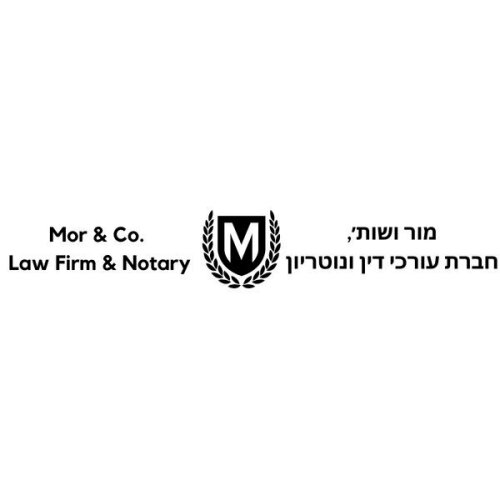Best Antitrust Litigation Lawyers in Israel
Share your needs with us, get contacted by law firms.
Free. Takes 2 min.
Or refine your search by selecting a city:
List of the best lawyers in Israel
About Antitrust Litigation Law in Israel
Antitrust litigation in Israel focuses on maintaining fair competition within the market and preventing business practices that restrict competition, exploit consumers, or harm the economy. Governed primarily by the Economic Competition Law, antitrust litigation addresses issues such as monopolies, cartels, restrictive arrangements, and abuse of dominant positions. Enforcement and oversight are led by the Israel Competition Authority, which investigates violations and may initiate legal proceedings. Litigants may include businesses, consumers, or the Authority itself, often involving complex legal and economic analysis.
Why You May Need a Lawyer
Antitrust litigation involves complicated legal and economic principles, making guidance from a legal specialist essential in many situations. You might need a lawyer if you:
- Are accused of participating in a cartel or price-fixing agreement.
- Suspect that competitors are engaging in unlawful monopolistic practices.
- Manage a company facing investigation or enforcement action by the Israel Competition Authority.
- Are planning a merger or acquisition that might require approval under Israeli competition law.
- Are a consumer or business harmed by anti-competitive behavior and wish to claim compensation.
- Need to draft contracts and ensure compliance with restrictive arrangement rules.
- Require representation in appeals against Authority decisions or in court litigation related to competition law.
Local Laws Overview
Antitrust and competition law in Israel is governed mainly by the Economic Competition Law, 5748-1988 (formerly known as the Restrictive Trade Practices Law). The law sets out rules regarding:
- Monopolies: Holding a market share exceeding 50 percent is considered being a monopoly, which entails additional obligations and restrictions on business conduct.
- Restrictive Arrangements: Agreements between parties that may reduce competition, such as price-fixing, market allocation, or limiting production, usually require approval from the Competition Authority or an exemption.
- Mergers: Certain mergers and acquisitions are subject to notification and must obtain clearance if they meet specific thresholds related to turnover or market share.
- Abuse of Dominant Position: Monopolies must not exploit their market power to the detriment of consumers or competitors, such as through unfair pricing or exclusionary conduct.
- Cartels: Collusion among competitors to manipulate market conditions, such as bid-rigging or fixing prices, is strictly prohibited and subject to criminal and civil penalties.
- Private Enforcement: Individuals and businesses harmed by anti-competitive practices may file lawsuits to claim damages.
Violations may result in severe consequences, including fines, personal liability for executives, and even imprisonment for criminal offenses.
Frequently Asked Questions
What is considered anti-competitive behavior under Israeli law?
Examples include price-fixing, bid-rigging, dividing markets among competitors, abusing a dominant market position, and engaging in mergers that restrain competition.
Who enforces antitrust laws in Israel?
The Israel Competition Authority is the main regulatory and enforcement body responsible for investigating violations, enforcing the law, and providing guidance.
How are mergers regulated in Israel?
Mergers that meet certain turnover or market share thresholds must be notified to and approved by the Israel Competition Authority to ensure they do not harm competition.
Can individuals or companies sue for damages under competition law?
Yes, businesses or individuals harmed by anti-competitive conduct can bring civil actions in court for damages against those responsible.
What penalties can be imposed for violations?
Penalties may include substantial fines, orders to cease unlawful behavior, personal liability for directors and officers, and even criminal sanctions such as imprisonment.
Are there exemptions to restrictive arrangement prohibitions?
Yes, certain arrangements may be granted exemptions if they meet statutory requirements, such as contributing to economic efficiency or serving the public interest without substantially restricting competition.
Does Israeli law apply to foreign companies?
Israeli competition law applies to activities that have a significant effect on competition within Israel, even if the business is based abroad.
How long does an investigation by the Competition Authority take?
The duration varies depending on the complexity of the case. Some investigations can take several months or even years, especially if extensive evidence and economic analysis are required.
What should I do if contacted by the Israel Competition Authority?
You should seek immediate legal advice before responding, as your statements or actions could have significant legal implications.
Are plea bargains possible in antitrust cases?
Yes, plea bargains may be negotiated with the Competition Authority in certain cases, particularly where cooperation is pledged and violations are acknowledged.
Additional Resources
For more information on antitrust matters in Israel, the following resources and bodies may be helpful:
- Israel Competition Authority - The principal regulator providing guidance, public information, and enforcement updates.
- Israeli Ministry of Justice - Offers legal resources, legislation, and policy statements on economic competition.
- Israel Bar Association - Maintains a directory of attorneys experienced in antitrust and competition law.
- Consumer Protection and Fair Trade Authority - Provides information and support to consumers affected by unfair market practices.
- Legal Aid Bureaus - Offer initial legal advice and referrals for individuals with limited financial means.
Next Steps
If you believe you are affected by anti-competitive behavior or have been contacted regarding an investigation or complaint, consider these steps:
- Document all relevant facts and communications thoroughly.
- Gather contracts, correspondence, and evidence related to the conduct in question.
- Contact a lawyer experienced in Israeli antitrust litigation as soon as possible to assess your situation and rights.
- Do not communicate with regulatory authorities or opposing parties without legal advice.
- Follow your attorney's guidance for responding to investigations, submitting documents, or pursuing litigation.
Legal complexities in antitrust matters can have far-reaching business and personal consequences. Expert legal support is essential for ensuring compliance, defending your interests, and seeking remedies through the legal system in Israel.
Lawzana helps you find the best lawyers and law firms in Israel through a curated and pre-screened list of qualified legal professionals. Our platform offers rankings and detailed profiles of attorneys and law firms, allowing you to compare based on practice areas, including Antitrust Litigation, experience, and client feedback.
Each profile includes a description of the firm's areas of practice, client reviews, team members and partners, year of establishment, spoken languages, office locations, contact information, social media presence, and any published articles or resources. Most firms on our platform speak English and are experienced in both local and international legal matters.
Get a quote from top-rated law firms in Israel — quickly, securely, and without unnecessary hassle.
Disclaimer:
The information provided on this page is for general informational purposes only and does not constitute legal advice. While we strive to ensure the accuracy and relevance of the content, legal information may change over time, and interpretations of the law can vary. You should always consult with a qualified legal professional for advice specific to your situation.
We disclaim all liability for actions taken or not taken based on the content of this page. If you believe any information is incorrect or outdated, please contact us, and we will review and update it where appropriate.
Browse antitrust litigation law firms by city in Israel
Refine your search by selecting a city.













